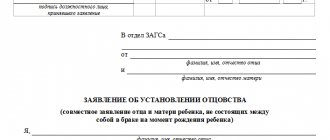Inheritance by minors
Children can legally inherit any property, including debts and obligations. In inheritance matters, they have a special status, because even when drawing up a will, the testator does not have the right to ignore their interests. According to Article 1149 of the Civil Code of the Russian Federation, children are included in the category of “obligatory heirs”.
This means that minors, in any case, will inherit the property due to them, despite the will of the testator . The testator may not want to include them in the inheritance under the will, but nevertheless the heirs will have to take them into account. The main conditions for such inheritance are:
- children must be related to the testator, who can be their parent, guardian, or trustee.
- Minors, even if they are not biological children of the deceased, must be financially dependent on the testator, that is, they are his dependents. In this case, he acts as the main breadwinner.
Children of other relatives (nephews) who are not dependent on the testator and are not his children are not considered obligatory heirs.
Documentation
The list of documents generally consists of the following items:
- a copy of documents on property that has become an inheritance;
- a copy of papers confirming the right of inheritance. Usually it appears due to kinship or a previously drawn up will;
- a copy of a certificate stating where the testator lived over the past few years;
- a copy of the death certificate;
- passport for a minor, if available;
- passport of the person who is the legal representative;
- statement of consent in connection with refusal. This is required if the child is ten years old or older;
- statement from a representative of interests.
Important! Guardianship authorities must be sure that entering into an inheritance becomes a phenomenon that is contrary to the interests of the child. It is also important to provide papers that state the obligations transferred to the new owners of the property. This will reduce the likelihood of failure.
Features of the transfer of a mandatory share
If the testator makes a will for other persons, then the children, in accordance with Art. 1149 of the Civil Code of the Russian Federation, a mandatory share of inherited property is due. There are no exceptions here, since the law protects the interests of children, so the will of the testator does not play a role here. He may prohibit them from inheriting in his will, but such a decision will be considered invalid.
This means that minors receive their part of the inheritance under a will at the rate of at least ½ share of the property if they inherited by law in accordance with Article 1149 of the Civil Code of the Russian Federation. In other words, in order to calculate the obligatory share of the inheritance, you must first select all the heirs of the 1st stage, including the child, and calculate their share of the inheritance according to the law, but the “legal share” of a minor must simply be divided in half according to Article 1149 of the Civil Code of the Russian Federation.
IMPORTANT! If the testator ignored his minor children or other obligatory heirs in the will, then the document is declared invalid. The inherited shares will be distributed according to the rules of Article 1149 of the Civil Code of the Russian Federation, and the main heirs will receive much less property than they were owed according to the document.
Let's say testator N bequeathed an apartment to his mother (father died), but he has a young child from a previous marriage who inherits an obligatory share of the property.
The mother of the deceased and the child are heirs of the 1st stage. If there had been no will, then by law they would have received 1/2 of the apartment, but in reality the child receives 1/4 of the obligatory share, that is, exactly half of his 1/2 legal share. Read more about the inheritance queue here.
The testator's mother will receive 3/4 of the property. If the testator had two young children, then each of them would receive 1/6 of the apartment, and the mother would be left with 1/2 of the property according to the will. The more compulsory heirs, the smaller the share of the inheritance under the will.
As for inheritance without a will, minors receive their part in equal shares along with other heirs, so no difficulties should arise here.
The obligatory share of the inheritance is determined based on the total number of all legal, obligatory heirs and the size of the inheritance, taking into account bequeathed and untested property.
The court may individually reduce the share of the inheritance depending on the circumstances of the case and the specifics of the property. The legal heir must prove that the child has other real estate and has not previously lived in this apartment, so this will not violate his legal interests in any way.
Independent acceptance of property by children
Children cannot fully accept the inheritance on their own. Only legally capable persons can enter into inheritance relations, but minors have a completely different status. The legislator identifies several age categories of incapacitated persons:
- from 0-14 years (completely incapacitated);
- from 14-18 years old (limited capacity).
From 0 to 14 years of age, a child is completely incapacitated, and therefore cannot independently write an application to a notary. Parents/guardians as legal representatives are fully responsible for it, therefore they are entrusted with the task of accepting the inheritance in accordance with Art. 28 Civil Code of the Russian Federation.
From 14 to 18 years of age, a person is partially incapacitated and therefore has the right to independently accept an inheritance with the written consent of the parents in accordance with Article 26 of the Civil Code of the Russian Federation.
This means that he can personally write a statement to a notary in the presence of his parents, who sign the document and also express their consent to inheritance on a separate sheet. Children over 16 years of age may be considered fully capable if they:
- have their own earnings or income.
- They work under an employment contract.
- Doing business.
In this case, the court or guardianship authorities recognize the children as emancipated and therefore they can do everything on their own.
REFERENCE : When a minor enters into an inheritance relationship, the participation of guardianship and trusteeship authorities is not required; therefore, their final word is not required.
Is it possible to waive an obligatory share in an inheritance?
According to the Civil Code of the Russian Federation, the obligatory share in the inheritance cannot be transferred to another person. You can simply refuse it without specifying specific individuals. To do this you will need to visit a notary.
Why does the law prohibit renouncing an obligatory share in favor of another person? The main reason is that the transfer of property is necessary to maintain financial status and provide for a particularly vulnerable category of heirs - disabled or minor dependents.
Waiver of an obligatory share in the inheritance in favor of other persons is impossible. This exclusive right belongs to the person designated in the law. Only he can use it.
If a disabled or minor dependent does not want to exercise his right to an obligatory share, he can refuse the inheritance, but not in favor of another person. In this case, the transfer of property is carried out by law or will and is accompanied by an increase in the share of other successors. One of the key requirements of regulations is that you cannot refuse only part of the obligatory share; the document must be drawn up for the entire inheritance.
Minor children cannot formalize a waiver of the obligatory share in the inheritance on their own. In this case, the procedure becomes significantly more complicated. To obtain a positive conclusion on a request to waive a share in the inheritance, it is necessary to provide permission from the guardianship and trusteeship authorities. It is issued only if the upcoming actions will not adversely affect the material well-being of the child or harm his rights. The most lengthy and labor-intensive process is the registration of a waiver of a mandatory share in real estate.
The procedure for a minor to inherit an inheritance
Many people are afraid of the question of how to do everything correctly so as not to deprive the child of the property they are owed. A similar principle of Art. 1152-1154 of the Civil Code of the Russian Federation, but with special conditions. A minor child can actually accept an inheritance in only one way, based on Art. 1153 of the Civil Code of the Russian Federation, that is, contact a notary and write an application. Depending on age, this can be done either by the legal representatives themselves, or by the teenager himself and his parents.
Where to contact?
To enter into an inheritance relationship, you must visit any notary office. It is advisable to do this at the address where the property is located or at the place of residence of the deceased testator. In the law, this is called the “place of opening of the inheritance.” Before applying, you need to collect all the documents justifying the right of inheritance.
The list of documents can be read on the official website of the notary office. Directly at the notary, parents/guardians or the teenager himself fills out an application.
Documentation
You cannot come to the notary empty-handed, as you must present documentary evidence of the right to inherit. Otherwise, the notary will not accept clients. If the heir is a child under 18 years of age, then the list of documents presented is similar to adults, with the exception of some nuances. If a minor appears in the case, the notary will require the following documents:
- death certificate of the testator (copy and original);
- passport, as well as the child’s birth certificate, where the testator is indicated as the father or mother;
- an extract from the house register, which contains all the information about all discharged and registered persons in the apartment;
- information confirming the relationship with the deceased;
- single housing document;
- an open will in which a minor citizen is indicated as an heir;
- passport of legal representatives;
- power of attorney for the child's representative (lawyer);
- other information.
The list of documents is not complete, since the inheritance situation of each applicant is individual.
Drawing up an application
To accept an inheritance from a notary, you must write an application. If the child is under 14 years old, then the document is entirely drawn up by the parents/guardians. For this, the will of one legal representative is sufficient.
If the heir is a teenager (from 14 to 18 years old), then he draws up and signs the application independently in the presence of his parents/guardians, who provide their details (full name, passport details, address) as legal representatives. On a separate sheet they write their consent to the fact that the minor child will accept the inheritance.
A signature must be affixed at the end of the application. The notary, as a rule, gives the legal representatives a ready-made form where they need to enter all the necessary information.
This makes the situation quite easy, since you don’t need to create anything on your own. The document must indicate the following details:
- Full name of the testator.
- Full name, passport details, address of parent/guardian
- Full name, passport details of the minor heir.
- Grounds for receiving an inheritance (will, law, family relationship).
- Date and signature of legal representatives and heir.
In our materials you will learn about such heirs: by right of representation, unworthy, disabled, commorients. It also talks about what to do if the heir has not entered into the inheritance within 6 months and about who the heir of the deceased heir is.
Grounds for invalidating a refusal of inheritance
Refusal of an inheritance is a transaction; accordingly, it can be declared invalid on the grounds provided for by law, such as
- Absence of a signature in the refusal or other required details,
- The refusal of inheritance was formalized even before the death of the testator
- The renunciation of inheritance was signed by an incapacitated citizen or limited in legal capacity by a court decision
- The heir was a minor and could not sign a waiver of inheritance without parental consent
- The refusal was made under delusion or the influence of deception, or the threat of violence.
In the presence of these circumstances, the refusal is considered invalid , but this must be recognized in court. In reality to cancel the refusal of inheritance , since it is drawn up by a notary, who will ask you whether you understand the consequences of refusal or not.
Is a power of attorney needed on behalf of a child?
Representatives of the child can be not only parents/guardians, but also outsiders, including lawyers in accordance with Article 1, Article 1153 of the Civil Code of the Russian Federation. The power of attorney must indicate the powers of the representative, which include:
- right to submit documents;
- the right to draw up an application;
- government payment duties;
- right to sign;
- obtaining a certificate.
In this case, the power of attorney must be drawn up in writing and notarized. The document itself is drawn up by parents or a teenager (from 14 to 18 years old), but only within the limits of their rights.
A minor must be present when submitting documents to a notary, but if this is not possible, then his signature on the power of attorney must be notarized.
Inheritance of a minor child
The state tries to take into account the interests of the minor, including in such matters as inheritance of property. So, a child who has lost one of his parents, in any case, has the right to his part of the property, equal to the remaining shares. Moreover, inheritance occurs regardless of whether the mother and father were in a registered marriage or not. The only caveat is that the deceased must be indicated as a parent on the child’s birth certificate.
When inheritance is carried out by will, the minor heir, even if he was not included in the will, has the right to his obligatory share in the inherited property. And if a smaller part of the property was named in the will, it must be increased to the size of the obligatory part.
A child (teenager) must accept his share of the inheritance. He, like his legal representative, has no right to refuse it.
State duty and other financial expenses
According to clause 5 of Article 333.38 of the Tax Code of the Russian Federation, minor heirs do not pay the state fee when contacting a notary regarding acceptance of an inheritance. The main condition: they must not be older than 18 years at the time of the death of the testator.
Other financial expenses occur if parents want to use the help of a professional representative. In various notary offices it is also possible to receive legal and technical assistance (production of documents), for which a fee is charged according to tariffs established individually in each notary firm.
Situations are different, so clients often need advice. It is quite possible to avoid unnecessary expenses if the case is simple or the applicants know the legislation in detail.
Voluntary refusal
Theoretically, a child can refuse an inheritance, but for this it is necessary to obtain permission from the guardianship and trusteeship authorities in accordance with Part 4 of Article 1157 of the Civil Code of the Russian Federation. Emancipated teenagers can freely refuse their inheritance, but all other children do not have this opportunity. The notary will not consider such applications without prior permission from special authorities.
REFERENCE: You should not confuse missing deadlines for accepting an inheritance with a real refusal of it, since these legal phenomena are not equivalent. The child becomes the owner of the obligatory share of property from the moment of the death of the testator.
Reasons
In order to refuse an inheritance, you must first contact the territorial guardianship and trusteeship authority. Employees of the institution must be convinced that the inherited property violates the interests of the child. As a rule, such grounds include cases of inheritance:
- Property responsibilities.
- Contractual or credit obligations.
- Collateral property.
- Huge debt to pay for utilities.
- Liabilities under promissory notes.
- Damaged property (apartment, house in disrepair).
The grounds for refusal may also include the presence of a minor child of similar property or the actual impossibility of living in the inherited apartment. In other words, the reasons for the refusal must be carefully argued so that such an inheritance is unprofitable for the child in a legal and factual sense.
How does this happen?
First, you need to contact the guardianship and trusteeship authorities with an application, which is submitted by the legal representative or the child, if he is 14 years old. The document must contain a request for permission to refuse inheritance. If the young heir is 10 years old (Article 57 of the RF IC), then he and his parent/guardian also write a statement expressing his consent to the refusal.
In addition, parents/guardians must provide a package of documents that is similar to when submitting an application to a notary. The guardianship authorities consider everything and make a decision within 15 days in accordance with Article 21 of Federal Law No. 48. They may refuse or allow the applicant to refuse the inheritance.
If permission is granted, the child and parents must contact a notary and write a corresponding application. If the guardianship and trusteeship authorities refuse the request, then the child can only enter into inheritance relations.
In conclusion, it must be said that inheritance of property by a minor is fraught with many nuances, although it is subject to the general rules of law. The testator's minor child is a compulsory heir, so he cannot be left without property.
In such cases, the exact age of the child, as well as all the circumstances of the case, are very important. It is necessary to take into account the number of all heirs, as well as the specifics of the inherited property, in order to know for sure how to act and not make mistakes.
Customer Reviews
Gratitude from gr. Kolesnikova A.N. Let me express my deep gratitude to the Legal Agency of St. Petersburg, located at Spassky Lane, 12. For their professional and friendly assistance in resolving my issue! I wish to continue working, bringing benefit to all residents of St. Petersburg. And not only.
Kolesnikov Alexander Nikolaevich.
Position: Head of the Metro Implementation Sector
PS: Before your company, I contacted 5 companies on this issue and received unclear answers.
Thanks to Pavlyuchenko A.V. from Astafieva A.S. I express my gratitude to the Legal Agency and in particular to lawyer Alexander Viktorovich Pavlyuchenko for the work done, high qualifications and high-quality approach. Thanks to Alexander Viktorovich, we managed to achieve a result in court in a case on the protection of consumer rights that I did not even expect. The amount recovered in court even exceeded my expectations. Thank you very much for your qualified work and professionalism.
Sincerely, Astafieva A.S., 03/01/2019
Review by Marcheilo I.V. On September 24, 2021, I turned to Konstantin Vasilievich for legal advice. I would like to express my gratitude for your sensitive, attentive attitude and qualified assistance. I received a comprehensive answer to all my questions. They helped a lot. Thank you! Sincerely, Marcheilo Irina Vladimirovna.
Thanks to Pavlyuchenko A.V. from Sonets V.V. I express my deepest gratitude to Alexander Viktorovich Pavlyuchenko for the consultation and competent approach to the matter, as well as the successful outcome in my problem. I also want to express my gratitude for your kindness. I wish you success in this work that is necessary for us.
Sincerely, Sonets V.V. 05/17/2018
Gratitude to Vasily Anatolyevich Dear Lyubov Vladimirovna.
I would like to express my gratitude to Vasily Anatolyevich for his competent legal assistance in solving my difficult case. I wish you and your company further prosperity and success in your hard work.
From the bottom of my heart and with best wishes. 05/03/2018
Gratitude from Vraveevsky S.A. Sergey Vyacheslavovich! Thank you very much for the consultation! All the details were disclosed to me in detail, all questions were answered comprehensively. I am very glad to receive help from a qualified specialist!
Vraveevsky S.A. 12/18/2018
Feedback from Gizatullina Dear leader!
I would like to express my deep gratitude to lawyer Lidiya Aleksandrovna Kuznetsova for her professional advice in solving my problem, for her sensitive, attentive attitude towards me as a client, for her competent approach to the matter. I also want to express my sincere gratitude to the team for their friendliness and professionalism. I wish you continued success in your legal career.
Gratitude from Potapova T.I. I express my gratitude to Denis Yuryevich Stepanov for the work done, high qualifications, as well as for very clear, accessible help in solving my problem (protection of consumer rights). Excellent, very competent lawyer. Thank you very much!
Sincerely, Potapova Tamara Ivanovna, 07/09/2019
Gratitude from Volkova N.E. I express my gratitude to Vasily Anatolyevich for his professional and competent assistance in resolving the issue of protecting my consumer rights. As a result, I received decent compensation from. Thank you!
Volkova N.E. November 30, 2018
Gratitude from Natalya Gurova I would like to express my gratitude for the qualified and friendly advice from legal practitioner Daria Igorevna Zaprudnaya, Vasily Anatolyevich Kavalyauskas and Daria Valentinovna Kutuzova. The environment at the law firm is welcoming and professional. I wish you continued prosperity. Thank you for your help.
Best regards, Natalia Gurova. 07/06/2018








